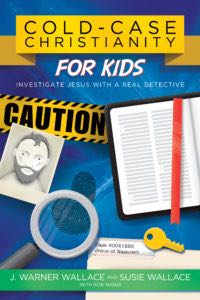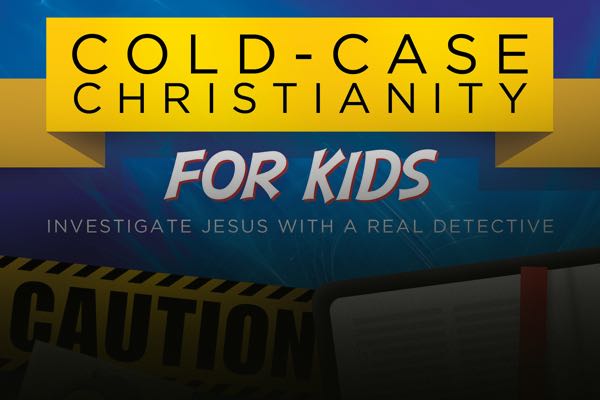
Fantastic New Apologetics Resource for Families: Cold-Case Christianity for Kids!
September 28, 2016 by Natasha Crain
If you’ve read my blog for a while, you’ve often seen me recommend the books of cold-case homicide detective (and former atheist), J. Warner Wallace. Det. Wallace’s books, Cold-Case Christianity and God’s Crime Scene, evaluate the case for the truth of Christianity and God’s existence from a detective’s perspective. They’re excellent, engaging, and wonderfully balanced between being sufficiently meaty and readable at the same time. I love them so much that Cold-Case Christianity and God’s Crime Scene are two of just five books in my apologetics reading plan for Christian parents!
Earlier this year, Det. Wallace announced that he and his wife, Susie, were writing kids’ versions of these books, and I couldn’t have been more excited. Parents regularly email me to ask for resources written directly for children, but there are very few available. I’m thrilled to let you know that the first of these kids’ versions is now available!
I had the opportunity to read a pre-release copy for review and wanted to share with you today why you need to get this if you have young kids.
Cold-Case Christianity for Kids: Investigate Jesus with a Real Detective is written for 8- to 12-year-olds and corresponds to the chapter sequence of the adult version of the book, so parents and kids can study together (I love that!). Even though 8 to 12 is the target age range, you can absolutely use this with 6- or 7-year-olds if you’re working through it with them and helping them understand the concepts. My 7-year-old son was so engaged by it that he read the first 60 pages in two days after receiving it.
So how does the book capture a young kid’s attention? It teaches the skills kids need for evaluating the truth of Christianity by first using those same skills to work on solving a skateboard mystery. Each chapter reveals something new about an old skateboard that the characters are interested in. The kids learn a new detective skill, then apply it to investigating the truth of Christianity. It’s an easy, engaging read that’s packed with value.
There’s one more level of awesomeness I need to mention: The book has a corresponding website, coldcasechristianityforkids.com, where each chapter has a free short video, activity sheet, notebook sheet, and adult leader guide to give you great conversation ideas. Kids can also earn a completion certificate. It’s the ultimate parent toolbox.
The thinking skills kids will learn from this book are critical for navigating today’s skeptical world. I couldn’t be happier that Det. Wallace and his wife have written such an excellent resource for helping families engage in these topics early in their kids’ faith development. I’ll be working through it with my own kids, ages 7 and 6, over the next few weeks, and I highly recommend it to any parent with kids in the 6- to 12-year-old age range.
If that’s you, click here to order it now!
For those who want more details, I’m providing a chapter-by-chapter breakdown below:
What Your Kids Will Learn
The book’s narrator and two friends, Hannah and Daniel, discover that the local police department is starting a new detective training academy for student cadets. The kids head over to the police station and meet Detective Jeffries, who will be leading their training for the next few weeks.
Daniel arrives at the first week of training with an old skateboard that he had strangely found in the tool shed behind his school. When Detective Jeffries overhears Daniel telling his friends that he doesn’t know how the skateboard originally ended up in the shed, he identifies a “mystery” they can work through together, and that kicks off the chapters that follow:
Chapter 1–Don’t Be a Know-It-All
In the first chapter, the reader learns about presuppositions (things you assume to be true, even before you begin investigating). The kids in the story jump to some conclusions about who owned the skateboard, leading to a discussion of how people often jump to conclusions about Christianity too—they rule out the possibility of miracles (such as the resurrection) because they presuppose God doesn’t exist.
Chapter 2–Learn to Infer
Next, kids learn how to draw reasonable conclusions from their observations (make “inferences”). The characters start by making observations about the skateboard and discussing the difference between reasonable and possible explanations for those observations. That lesson is then applied to the evidence for Jesus’ resurrection and kids work through the possible and reasonable explanations for the basic historical facts we know.
Chapter 3–Think Circumstantially
In this chapter, kids are introduced to the difference between direct and indirect (circumstantial) evidence. As the characters continue working to solve the skateboard mystery, they learn that circumstantial evidence can be just as important as direct evidence from witnesses. Det. Jeffries goes on to explain the basics of the circumstantial case for God—a universe that began to exist, a universe that is finely tuned, the information in DNA and “big, moral truths.”
Chapter 4–Test Your Witnesses
As the characters begin talking to possible witnesses in the skateboard mystery, they find that the witnesses’ stories don’t always agree. This provides the background for a discussion of the fact that witnesses never agree entirely. A four-question framework is provided for evaluating the testimony of any witness and then applied to the Gospel writers. (This was my favorite chapter–lots of important content for kids to learn!)
Chapter 5–Respect the Chain of Custody
How do we know the Gospels haven’t changed over time? That’s the subject of chapter 5. The characters consider the many people who may have had contact with the mystery skateboard (the “chain of custody”) and then learn how the gospel was reliably passed down from the apostles.
Chapter 6—Hang on Every Word
In this chapter, the characters interview a possible skateboard witness and learn how to read between the lines of what a witness says—the small details can be meaningful. This skill is then used in a case study of looking at the evidence that Mark’s gospel was based on Peter’s eyewitness accounts.
Chapter 7—Separate Artifacts from Evidence
Chapter 7 is an age-appropriate lesson in textual criticism—how we can determine what the Gospels originally said based on the copies we have today (the originals no longer exist). The characters learn that not everything about the skateboard is relevant to answering the question of its original ownership, just as not every difference between copies of the Bible is relevant to determining their reliability.
Chapter 8—Resist Conspiracy Theories
In the final chapter, the characters step back to look at the big picture of all they’ve learned and talk about why lies are hard to keep. They learn what it takes to pull off a big lie (a “conspiracy”) and why that makes it so unlikely that the apostles were all lying about Jesus.
So that’s some great stuff, right? Indeed it is. Click here to get your copy now!
Thanks so much to Natasha for her review of Cold-Case Christianity for Kids. Susie and I, when writing the book, wanted to prepare a resource for kids to use before they entered the Junior High years. Many studies show that kids first start having questions and doubts about their Christian beliefs in these critical years. We hope Cold-Case Christianity for Kids will help you establish a foundation with your kids before they begin to be influenced by our increasingly hostile culture.
J. Warner Wallace is a Cold-Case Detective, a Christian Case Maker, and the author of Cold-Case Christianity, Cold-Case Christianity for Kids, and God’s Crime Scene.
Comment or Subscribe to J. Warner’s Daily Email
Save
Save
J. Warner Wallace is a Dateline featured cold-case homicide detective, popular national speaker and best-selling author. He continues to consult on cold-case investigations while serving as a Senior Fellow at the Colson Center for Christian Worldview. He is also an Adj. Professor of Christian Apologetics at Talbot School of Theology, Biola University, and a faculty member at Summit Ministries. He holds a BA in Design (from CSULB), an MA in Architecture (from UCLA), and an MA in Theological Studies (from Gateway Seminary).








































